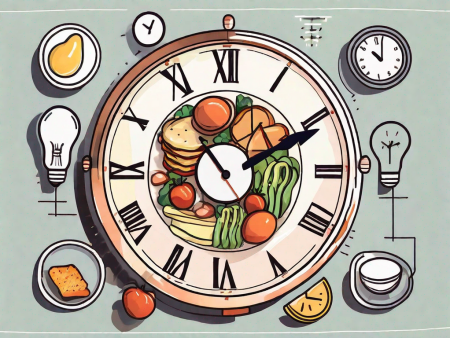Discover the intricate relationship between sleep and energy levels in this comprehensive guide.
How Does Sleep Impact Energy Levels? A Comprehensive Guide
Having high energy levels is vital for our overall well-being and productivity. But did you know that sleep plays a crucial role in maintaining optimal energy levels? In this comprehensive guide, we will explore the intricate relationship between sleep and energy, diving deep into the science, the connection, and the importance of sleep hygiene. So, grab your favorite blanket and prepare to embark on a journey to better understand how sleep impacts our energy.

Understanding the Basics of Sleep
Sleep may seem like a simple concept, but it is far more complex than meets the eye. To fully grasp its impact on our energy levels, we need to go back to the basics. So, let’s start with the science of sleep and the different stages our body goes through while catching those precious Z’s.
Have you ever wondered what happens to your body when you sleep? It’s not just a time of rest and relaxation; it’s a time of incredible activity and rejuvenation. When we close our eyes and drift off into dreamland, our body enters a fascinating state of rest. During sleep, our brain and body undergo a series of intricate processes that are essential for our well-being. The release of hormones, brain wave patterns, and restoration of energy all contribute to this miraculous phenomenon.
Let’s dive deeper into the science of sleep and explore the different stages that our body experiences during a typical night’s rest. Understanding these stages can give us valuable insights into the importance of quality sleep.
The Science of Sleep: An Overview
When it comes to sleep, there’s more going on than meets the eye. It’s not just a time when our body shuts down; it’s a time when it actively works to restore and rejuvenate itself. The science of sleep is a fascinating field that delves into the intricate processes that occur while we slumber.
One of the key aspects of sleep is the release of hormones. During sleep, our body produces and regulates various hormones that play a vital role in our overall well-being. These hormones help regulate our metabolism, promote growth and development, and even influence our mood and emotions.
Another important aspect of sleep is the brain wave patterns that occur during different stages. These patterns can be measured using electroencephalography (EEG) and provide valuable insights into the quality of our sleep. Different stages of sleep are characterized by distinct brain wave patterns, which indicate the level of activity and restoration happening in our brain.
Furthermore, sleep is a time when our body restores its energy reserves. It’s like a recharge for our physical and mental well-being. During sleep, our body repairs damaged tissues, synthesizes essential molecules, and replenishes energy stores. This restoration process is crucial for maintaining optimal health and functioning.
The Different Stages of Sleep
Sleep is not a monotonous state; it is composed of different stages that cycle throughout the night. Understanding these stages can give us a deeper appreciation for the complexity of sleep and its impact on our well-being.
We start with non-rapid eye movement (NREM) sleep, which is further divided into three stages. NREM stage 1 is the transition from wakefulness to sleep, characterized by slow eye movements and relaxed muscles. NREM stage 2 is a deeper stage of sleep, where our brain waves slow down, and our body temperature drops. Finally, NREM stage 3 is the deepest stage of sleep, also known as slow-wave sleep. This stage is crucial for physical restoration and growth.
After the NREM stages, we enter the rapid eye movement (REM) sleep stage. This is when dreams take center stage. During REM sleep, our brain becomes highly active, and our eyes move rapidly. It is during this stage that we experience vivid dreams and intense brain activity. REM sleep is essential for cognitive function, memory consolidation, and emotional processing.
The Role of Sleep in Human Health
While we sleep, our body works tirelessly to repair and restore itself. Sleep is not just a luxury; it is a necessity for our overall health and well-being. Understanding the role of sleep in human health can help us prioritize quality sleep and reap its benefits.
One of the key ways sleep influences our health is through its impact on the immune system. During sleep, our immune system becomes more active, producing infection-fighting cells and antibodies. This helps protect us from illness and infection. Lack of sleep can weaken our immune system, making us more susceptible to diseases.
Sleep also plays a crucial role in metabolism and weight regulation. When we sleep, our body regulates hormones that control hunger and satiety. Sleep deprivation can disrupt these hormones, leading to increased appetite and a higher risk of obesity. Additionally, sleep deprivation can affect our body’s ability to process glucose, increasing the risk of diabetes.
Furthermore, sleep is closely linked to memory and cognitive function. While we sleep, our brain consolidates memories and processes information, helping us retain what we’ve learned and improve our cognitive abilities. Lack of sleep can impair memory, attention, and decision-making skills.
As you can see, sleep is not just a time of rest; it is a time of incredible activity and restoration. It affects our immune system, metabolism, memory, and cognitive function, all of which play a crucial role in our energy levels and overall well-being. So, the next time you hit the hay, remember that you’re not just sleeping; you’re embarking on a fascinating journey of restoration and rejuvenation.
The Connection Between Sleep and Energy Levels
Sleep and energy levels go hand in hand, and disrupting this delicate balance can have profound consequences. In this section, we’ll explore how lack of sleep, quality sleep, and sleep disorders impact our energy reserves.
How Lack of Sleep Affects Energy
We’ve all experienced those nights when we toss and turn, unable to find the elusive land of slumber. The next day, we wake up feeling groggy, irritable, and low on energy. That’s because lack of sleep deprives our body of the opportunity to recharge and restore itself fully. It affects our brain’s ability to function optimally, leading to decreased alertness and a noticeable slump in energy levels.
When we don’t get enough sleep, our body’s natural energy production processes are disrupted. During sleep, our body goes through various stages, including deep sleep and REM sleep, which are crucial for restoring energy and promoting overall well-being. Without sufficient sleep, these processes are compromised, resulting in decreased energy levels.
Furthermore, lack of sleep affects our hormone levels. Sleep deprivation can lead to an increase in the production of stress hormones such as cortisol, which can further contribute to feelings of fatigue and low energy. Additionally, inadequate sleep disrupts the balance of hormones that regulate appetite, leading to an increased desire for high-calorie foods and potential weight gain, which can also impact energy levels.
The Impact of Quality Sleep on Daily Energy
On the flip side, getting quality sleep can do wonders for our energy levels. When we enjoy a restful night’s sleep, our body is able to replenish its energy stores and prepare us for the day ahead. Quality sleep allows us to wake up feeling refreshed, rejuvenated, and ready to take on the world with a bounce in our step.
During deep sleep, our body releases growth hormone, which helps repair and regenerate tissues, including muscles and bones. This process is essential for maintaining optimal physical energy levels. Additionally, quality sleep enhances cognitive function, memory consolidation, and overall mental clarity, all of which contribute to increased energy throughout the day.
Moreover, quality sleep promotes a healthy immune system. During sleep, our body produces and releases cytokines, which are proteins that help regulate immune responses. A strong immune system is vital for warding off illnesses and infections that can drain our energy. Therefore, by prioritizing and ensuring quality sleep, we can boost our immune system and maintain higher energy levels.
Sleep Disorders and Energy Levels
Unfortunately, sleep is not always a peaceful affair. For some, sleep disorders make it challenging to get the rest they need, leading to pronounced fatigue and a perpetual state of low energy. Conditions such as insomnia, sleep apnea, and narcolepsy can disrupt the quality and quantity of our sleep, making it crucial to address these disorders to ensure optimal energy levels.
Insomnia, characterized by difficulty falling asleep or staying asleep, can result in chronic sleep deprivation and a constant feeling of exhaustion. Sleep apnea, on the other hand, causes interruptions in breathing during sleep, leading to frequent awakenings and poor sleep quality. These disruptions prevent individuals from reaching the restorative stages of sleep, leaving them fatigued and lacking energy during the day.
Narcolepsy, a neurological disorder, causes excessive daytime sleepiness and sudden sleep attacks. People with narcolepsy often struggle to maintain wakefulness, leading to significant disruptions in daily functioning and energy levels. Managing sleep disorders through various treatment options, such as medication, therapy, and lifestyle changes, is crucial for improving energy levels and overall well-being.
In conclusion, sleep and energy levels are intricately connected. Lack of sleep can have a detrimental impact on our energy reserves, while quality sleep promotes optimal energy levels and overall well-being. Understanding the importance of sleep and addressing any sleep disorders is essential for maintaining high energy levels and leading a healthy, productive life.
The Importance of Sleep Hygiene for Energy Conservation
Now that we understand the underlying science and connection between sleep and energy, it’s time to discuss how we can optimize our sleep hygiene to conserve and enhance our energy levels. So, let’s delve into the concept of sleep hygiene and explore practical tips for improving our nighttime routines.
The Concept of Sleep Hygiene
Sleep hygiene refers to the various habits and practices that contribute to better sleep quality. It involves creating an environment conducive to sleep, establishing a consistent bedtime routine, and adopting lifestyle choices that promote restful slumber. By prioritizing sleep hygiene, we can curate an environment that sets the stage for optimal energy conservation.
Tips for Improving Sleep Hygiene
Improving sleep hygiene doesn’t have to be a daunting task. Simple adjustments to our habits and routines can make a world of difference. Establishing a regular sleep schedule, creating a relaxing bedtime routine, and limiting exposure to electronic devices before bed can all contribute to better sleep quality and, subsequently, higher energy levels.
The Impact of Sleep Environment on Energy Levels
Creating a sleep-conducive environment is essential for maximizing the restorative power of sleep. Factors such as room temperature, lighting, and noise levels can significantly impact our ability to fall asleep and stay asleep throughout the night. By optimizing our sleep environment, we can create an oasis of calm that promotes deep, restful sleep and restores our energy.
How Diet and Exercise Influence Sleep and Energy
While sleep is a potent catalyst for energy conservation, other lifestyle factors also play a significant role. In this section, we’ll explore how our diet choices and exercise routines impact both our sleep quality and overall energy levels.

The Role of Diet in Sleep Quality and Energy Levels
Our dietary choices have a multidimensional impact on our physical and mental well-being, including our sleep quality and energy levels. Consuming a balanced diet that includes essential nutrients can help regulate sleep-wake cycles, promote feelings of wakefulness during the day, and combat daytime fatigue.
The Impact of Exercise on Sleep and Energy
Engaging in regular physical activity not only enhances our physical fitness but also has a profound impact on our sleep quality and energy levels. Exercise acts as a natural energizer, promoting deeper, more restorative sleep and providing a natural boost to our energy reserves. By incorporating regular exercise into our routine, we can experience improved sleep quality and a noticeable increase in daytime energy levels.
Now that we’ve explored the intricate relationship between sleep and energy, it’s clear that prioritizing high-quality sleep is essential for maintaining optimal energy levels. By gaining a deeper understanding of the science, connection, and importance of sleep hygiene, we can take proactive steps to enhance our sleep and, ultimately, our energy. So, let’s embrace the power of a good night’s sleep and unlock the boundless energy that awaits us.








Thank you for your sharing. I am worried that I lack creative ideas. It is your article that makes me full of hope. Thank you. But, I have a question, can you help me?
I don’t think the title of your article matches the content lol. Just kidding, mainly because I had some doubts after reading the article. https://accounts.binance.com/zh-TC/register?ref=VDVEQ78S